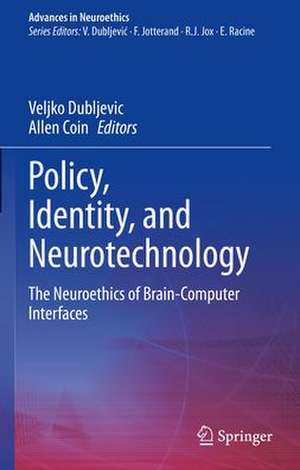Policy, Identity, and Neurotechnology: The Neuroethics of Brain-Computer Interfaces: Advances in Neuroethics
Editat de Veljko Dubljević, Allen Coinen Limba Engleză Hardback – 27 apr 2023
| Toate formatele și edițiile | Preț | Express |
|---|---|---|
| Paperback (1) | 702.05 lei 39-44 zile | |
| Springer International Publishing – 7 mai 2024 | 702.05 lei 39-44 zile | |
| Hardback (1) | 970.31 lei 3-5 săpt. | +34.32 lei 6-12 zile |
| Springer International Publishing – 27 apr 2023 | 970.31 lei 3-5 săpt. | +34.32 lei 6-12 zile |
Preț: 970.31 lei
Preț vechi: 1021.38 lei
-5% Nou
Puncte Express: 1455
Preț estimativ în valută:
185.68€ • 195.24$ • 153.42£
185.68€ • 195.24$ • 153.42£
Carte disponibilă
Livrare economică 27 martie-10 aprilie
Livrare express 12-18 martie pentru 44.31 lei
Preluare comenzi: 021 569.72.76
Specificații
ISBN-13: 9783031268007
ISBN-10: 3031268008
Pagini: 283
Ilustrații: VI, 283 p. 10 illus., 9 illus. in color.
Dimensiuni: 155 x 235 x 22 mm
Greutate: 0.7 kg
Ediția:2023
Editura: Springer International Publishing
Colecția Springer
Seria Advances in Neuroethics
Locul publicării:Cham, Switzerland
ISBN-10: 3031268008
Pagini: 283
Ilustrații: VI, 283 p. 10 illus., 9 illus. in color.
Dimensiuni: 155 x 235 x 22 mm
Greutate: 0.7 kg
Ediția:2023
Editura: Springer International Publishing
Colecția Springer
Seria Advances in Neuroethics
Locul publicării:Cham, Switzerland
Cuprins
1. An Introduction to Policy, Identity, and Neurotechnology: The Neuroethics of Brain-Computer Interfaces.- Part 1: The Past, Present, and Future of BCI Technology.- 2. Posthuman subjectivity in BCI-VR entanglement.- 3. “The trauma of losing your own identity again”: The Ethics of Explantation of Brain-Computer Interfaces.- 4. Ethical Considerations of Endovascular Brain-Computer Interfaces.- 5. Future Developments in Brain/Neural-Computer Interface Technology.- 6. A Path to Science Fiction Style Technology Applications? The Example of Brain-to-Brain Interfaces.- Part 2: Ethical and Philosophical Issues.- 7. A Scoping Review of the Academic Literature on BCI Ethics.- 8. "HAVING THE ABILITY TO HAVE A GOOD LIFE: What might be the impact of BCIs?".- 9. Cyborg Virtues: Using Brain Stimulation for Moral Enhancement.- 10. Brain Co-Processors: Ethical and Social Implications.- Part 3: Legal and Policy Implications.- 11. United States Policy on BCIs: Funding Research, Regulating Therapies, and Commercializing Consumer Technology.- 12. "Memory Enhancement and Brain Computer Interface Devices: Technological Possibilities and Constitutional Challenges".- 13. Cyberneurosecurity.- 14. Perspectives of Current FDA Guidance on BCI Technology.- 15. Neurotechnology, Stakeholders, & Neuroethics: Real Decisions and Tradeoffs from an Insider’s Perspective.
Notă biografică
Veljko Dubljević, Ph.D., D.Phil., is a University Faculty Scholar and Associate Professor of Philosophy and Science, Technology & Society at NC State University, and leads the NeuroComputational Ethics Research Group. He is a member of the Board of Directors of the International Neuroethics Society, Editor of American Journal of Bioethics - Neuroscience, recipient of a NSF CAREER award, and has published extensively in neuroethics, neurophilosophy and ethics of AI.
Allen Coin, MA, works as a Web Strategist at NC State University, where he is also an Associate Member of the NeuroComputational Ethics Research Group. He currently holds a master's degree focused on Science, Technology, and Society (STS) and his research interests are in the ethical and societal implications of emerging technologies, particularly neurotechnology and AI. Under the guidance of Dr. Dubljević, Coin has published a number of papers on BCIs as the lead author.
Textul de pe ultima copertă
In this volume the authors explore the landscape of thought on the ethical and policy implications of Brain Computer Interface (BCI) technology. BCI technology is a promising and rapidly advancing research area. Recent developments in the technology, based on animal and human studies, allow for the restoration and potential augmentation of faculties of perception and physical movement, and even the transfer of information between brains. Brain activity can be interpreted through both invasive and non-invasive monitoring devices, allowing for novel, therapeutic solutions for individuals with disabilities and for other non-medical applications. However, a number of ethical and policy issues have been identified from the use of BCI technology, with the potential for near-future advancements in the technology to raise unique new ethical and policy questions that society has never grappled with before.
The volume has three parts: 1) Past, Present and Future of BCI technology, 2) Ethical and Philosophical Issues and 3) Legal and Policy Implications. The rich and detailed picture of the field of BCI ethics with contributors from various fields and backgrounds, from academia and from the commercial sphere may serve as an introductory textbook into the neuroethics of BCI, or as a resource for neuroscientists, engineers, and medical practitioners to gain additional insight into the ethical and policy implications of their work.
Caracteristici
Focuses on policy oriented ethical analysis of clinical and commercial applications of BCI Provides an up-to-date summary of the ethical, social, and policy implications of BCI technology Looks at the past, present, and future of the BCI technology










